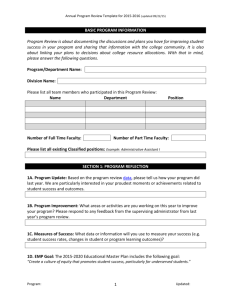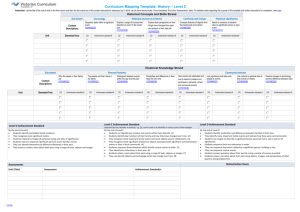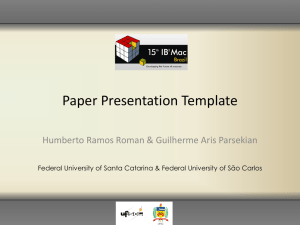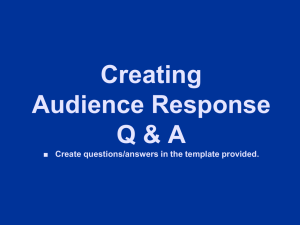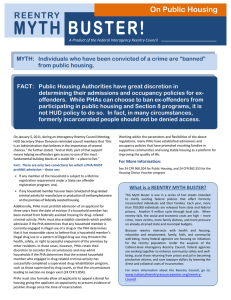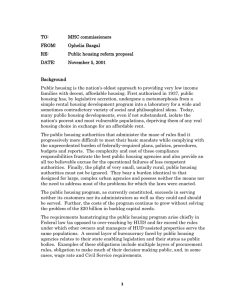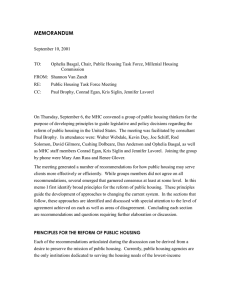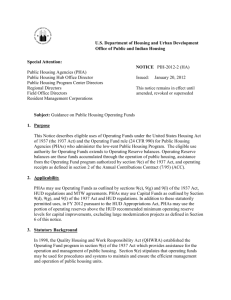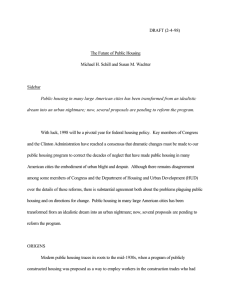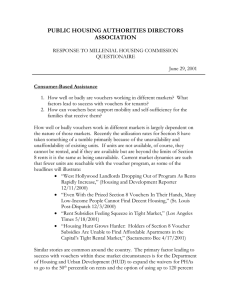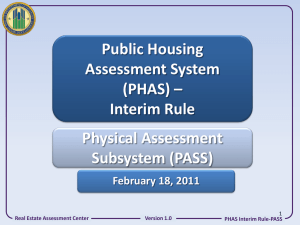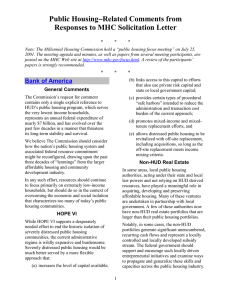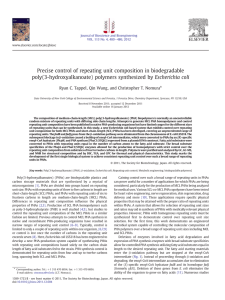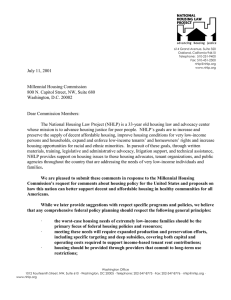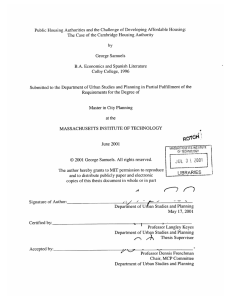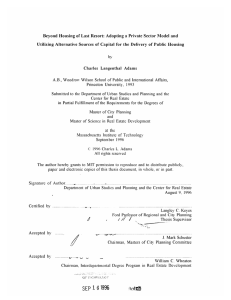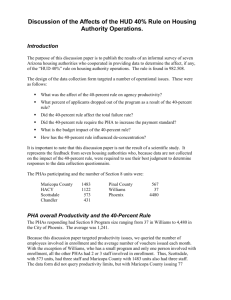New Product Business Plan
advertisement
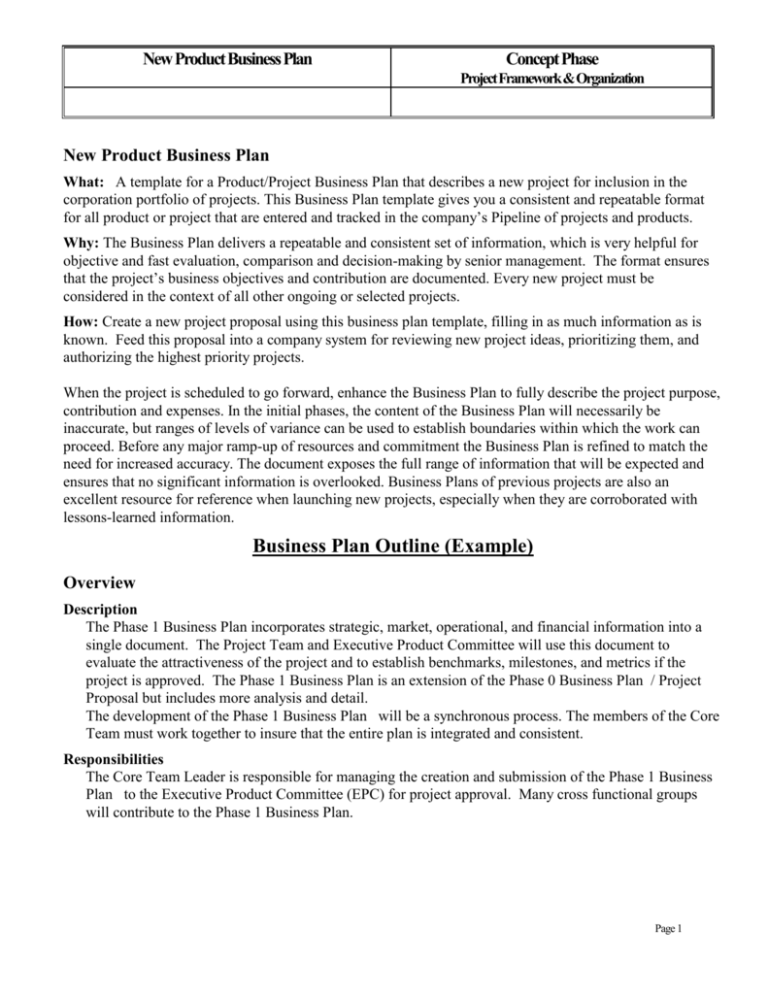
New Product Business Plan Concept Phase Project Framework & Organization New Product Business Plan What: A template for a Product/Project Business Plan that describes a new project for inclusion in the corporation portfolio of projects. This Business Plan template gives you a consistent and repeatable format for all product or project that are entered and tracked in the company’s Pipeline of projects and products. Why: The Business Plan delivers a repeatable and consistent set of information, which is very helpful for objective and fast evaluation, comparison and decision-making by senior management. The format ensures that the project’s business objectives and contribution are documented. Every new project must be considered in the context of all other ongoing or selected projects. How: Create a new project proposal using this business plan template, filling in as much information as is known. Feed this proposal into a company system for reviewing new project ideas, prioritizing them, and authorizing the highest priority projects. When the project is scheduled to go forward, enhance the Business Plan to fully describe the project purpose, contribution and expenses. In the initial phases, the content of the Business Plan will necessarily be inaccurate, but ranges of levels of variance can be used to establish boundaries within which the work can proceed. Before any major ramp-up of resources and commitment the Business Plan is refined to match the need for increased accuracy. The document exposes the full range of information that will be expected and ensures that no significant information is overlooked. Business Plans of previous projects are also an excellent resource for reference when launching new projects, especially when they are corroborated with lessons-learned information. Business Plan Outline (Example) Overview Description The Phase 1 Business Plan incorporates strategic, market, operational, and financial information into a single document. The Project Team and Executive Product Committee will use this document to evaluate the attractiveness of the project and to establish benchmarks, milestones, and metrics if the project is approved. The Phase 1 Business Plan is an extension of the Phase 0 Business Plan / Project Proposal but includes more analysis and detail. The development of the Phase 1 Business Plan will be a synchronous process. The members of the Core Team must work together to insure that the entire plan is integrated and consistent. Responsibilities The Core Team Leader is responsible for managing the creation and submission of the Phase 1 Business Plan to the Executive Product Committee (EPC) for project approval. Many cross functional groups will contribute to the Phase 1 Business Plan. Page 1 New Product Business Plan Concept Phase Project Framework & Organization Top Level Schedule of Major Tasks PHAS E 0 CONCE PT PHAS E 1 INITIAT ION PHAS E 2 EXECUT ION PHAS E 3 A PPR OVAL PHAS E 4 DELIVER Y Key Deliverables Deliverable Description Owner Phase 1 Business Plan Business Plan Document Core Team Leader Core Team Budget See product Business Plan template below Core Team Leader Financial Sensitivity Analysis Financial worksheets Finance Project Authorization Financial Worksheet see attached Finance Page 2 New Product Business Plan Concept Phase Project Framework & Organization Development Budget - Resources Group Phase 1 Plan Phase 2 Actual Plan Phase 3 Actual Plan Phase 4 Actual Plan Actual Engineering Marketing Manufacturing Finance & Others Issues Brief Description with Reference Dates Start/Finish Owner Brief Resolution Taken with Reference Page 3 New Product Business Plan Concept Phase Project Framework & Organization Business Plan Product Name: ____________________ Phase: __ Date: _________ Project Leader: _____________________ Objectives Market Technical Financial Manufacturing Critical Success Factors (CSF’s) (e.g. Cost of Delay, ROI, ROA, Time to Volume, Total Customer Cost, etc ) Product Description & Classification Type: Strategic Fit Value Propositions: Relative Advantage: Strategic Issues: Strategic Imperatives: Market Window Project Plan Tradeoff: Scope - Schedule – Resources =>> leads to Product Definition Project Objective Statement (Simple, Clear, Understandable by ALL) Task Breakdown (High Level) Schedule & Milestones (Phase Review, Key Design Reviews, Proto -Alpha, - Beta Product releases) Resource Plan (Key Skills or Partnerships) Risk Plan with Preventive & Contingency Plans Tracking & Control (Hard & Soft Information) Information Report Plan (Hierarchical Reports, Timing etc.) Change Control (Flexible but protects customer requirements & schedule as high priority) Design Reviews (HW, SW, Test, Integration, Release) Test Plans and Criteria (Internal & External/Customer tests) Standards Compliance (Local & Global agencies) Documentation Plan (Development & Release) Phase Review – Business Driven at Critical Milestones including Closeout Organization Team Formation, Leadership, Roles & Responsibilities, Cross Functional Relations) Product Release and Customer Acceptance Plan with Participation (Proto-Alpha & Beta) Approval to Launch/Initiate or proceed to next phase by Executive Product Committee or delegates. Technical Description Function Interfaces Critical Performance Specifications Page 4 New Product Business Plan Concept Phase Project Framework & Organization Cost Estimate Technology Internal External Alliances & Partnerships Manufacturing Manufacturing Process Integration Transfer from Development Plan Quality Assembly & Test Process Cost Support Marketing Product Channel Support Key Customers (Identified & early participation in evaluation agreed to) Volume & Revenue forecasts Features and functions ranked as benefits Competitive analyses Market Analysis: Revenues ($) Segment Y1 Y2 Y3 Y4 Y5 Our Share X Y Z $ $ $ $ $ $ $ $ $ $ $ $ $ $ $ $ $ $ $ $ Total Market Rev. $ $ $ $ $ Target Customers (Units/Year) Customer Y1 Y2 Y3 Y4 Y5 Customer A Customer B Customer C a1 0 0 a2 b2 0 a3 b3 c1 a4 b4 c2 a5 0 c3 # # # # # Total Units Competitive Analysis: Market Share (Units/Year) Y1 Y2 Y3 Y4 Y5 Our Share Competitor. -1 Competitor. -2 # # # # # # # # # # # # # # # Total Competition # # # # # Page 5 New Product Business Plan Concept Phase Project Framework & Organization Risks Issues: Intellectual Property Rights Financial Analysis: Y1 Y2 Y3 Y4 Y5 Revenues $ $ $ $ $ COGS $ $ $ $ $ Margin % % % % % Critical Success Factors Tracking CSF Plan Ph 0 Ph 1 Actual by Phase Ph 2 Ph 3 Ph 4 Plan preparation and approval to proceed: Signoff Signature Date Issue # Author Contributors List members Editor External Reviewers List members Executive Project Committee Review Board List members Page 6 New Product Business Plan Concept Phase Project Framework & Organization Business Plan Preparation Task Descriptions # Task Responsibility Description 1 Review Phase 0 Business Plan Core Team Leader Review Phase 0 Business Plan. Identify areas requiring additional analysis or detail. Assign responsibility to appropriate Core Team member. 2 Review strategic fit, overall objectives, and qualitative factors Core Team Leader Review all non quantitative inputs into the Business Plan 3 Revenue Analysis Marketing Marketing will forecast revenues, units, and ASPs (Avg. Sell Price). 4 Manufacturing Cost Analysis Engineering Engineering, Manufacturing Finance will model the manufacturing costs. 5 Development and Introduction Cost Analysis Engineering Engineering and Marketing will model the development and introduction costs. 6 Risk Assessment Core Team Leader A risk assessment is conducted to determine financial discount rate. Marketing will give input on risk factors. Finance will translate the risk factors into a discount rate established by finance. 7 Financial Return and Sensitivity Analysis Finance Finance will review all quantitative inputs. Financial return and sensitivity analysis is computed & reviewed by Core Team. 8 Core Team reviews and Signoff the Business Plan Core Team Members Core Team member’s review the Business Plan. Members agree on completion. 9 Present the Phase 1 Business Plan to the Exec Board OK to Proceed to Phase 2 Core Team Leader Core Team leader initiates a Phase Review of the project Business Plan and other documents are submitted to the EPC for review. Page 7

